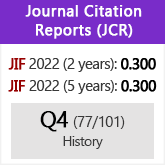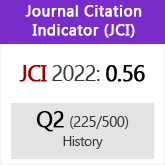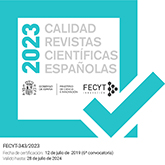Sofía Casanova and the First World War. Changing the Public Sphere
DOI:
https://doi.org/10.3989/chdj.2016.018Keywords:
Empowerment, Journalism, Feminism, Catholicism, Bolshevik Revolution, Nationalism, CitizenshipAbstract
Sofía Casanova was a Spanish journalist and a Red Cross voluntary during World War One. Her chronicles were published by right wing diary ABC. Sofía Casanova was married with polish philosopher Wicenty Lutoslawski since 1887, lived at Polonia, and it is able to think about her as a “regular” middle-up class woman. However, if it is developed a biographic approach and it is focused in Casanova’s representations about both public and private spheres during Great War, some differences show up. Between 1914 and 1918, there was an irregular modification in gender system. The war impact in every-day life was an asymmetric modification of public-private boundaries. That historical phenomenon also depended on gender cross-wise categories as class, religion and nationalism. Sofía Casanova was in rear of the eastern front: she was both a witness and and a principal actor in all those events that modified public sphere.
Downloads
References
Alzate, Carolina (2011) "Aptitud de las mujeres para ejercer todas las profesiones: Comentarios memoria presentada por Soledad Acosta de Samper en el Congreso Pedagógico Hispano-Lusitano- Americano reunido en Madrid en 1892". Revista de estudios sociológicos: 166-168;169-175.
Arendt, Hannah (2003) La condicion humana. Paidós, Barcelona.
Armstrong, Nancy (1991) Deseo y ficción doméstica. Cátedra, Valencia.
Beddoe, Deirdre (1989) Back to Home and Duty: Women Between the Wars, 1918-1939. Pandora, London.
Butler, Judith (2001) El grito de Antígona, Apertura. El Roure, Barcelona.
Canning, Kathleen (2006) Gender history in practice : historical perspectives on bodies, class & citizenship. Cornell University Press, Ithaca.
Cardinal, Agnes; Goldman, Dorothy and Hattaway, Judith (eds.) (1999) Women's writing on the First World War. Oxford University Press, Oxford.
Chambers, Deborah; Steiner, Linda and Fleming, Carole (2004) Women and journalism. Routledge, London.
Davidoff, Leonore (1998) "Regarding some 'old husbands' tales': Public and Private in Feminist History". In Feminism, the Public and the Private, edited by Landes, Joan B. Oxford University Press, Oxford: 164-194.
Doan, Laura (2006) "A Challenge to 'Change'? New Perspectives on Women and the Great War". Women's History Review, 15: 337-343. https://doi.org/10.1080/09612020500529861
Gatrell, Peter (1999) A whole empire walking: refugees in Russia during World War I. Indiana University Press. PMid:10459890
Gatrell, Peter (2003) "The Epic and the Domestic. Women War in Russia". In Evidence, History, and the Great War. Historians and the Impact of 1914-18, edited by Braybon, Gail. Berghahn Books, Oxford: 198-215.
Hooper, Kirsty (2008) A Stranger in My Own Land: Sofia Casanova, a Spanish Writer in the European Fin De Siècle. Vanderbilt University Press, Nashville.
Horn, Pamela (2010) Women in the 1920s. Amberley Publishing, Gloucestershire.
Kent, Susan K. (2009) Aftershocks: politics and trauma in Britain, 1918-1931. Palgrave Macmillan, New York. https://doi.org/10.1057/9780230582002
Kuhlman, Erika A. (2008) Reconstructing patriarchy after the Great War: women, gender, and postwar reconciliation between nations. Palgrave Macmillan, New York. https://doi.org/10.1057/9780230612761
Landes, Joan B. (1988) Women and the Public Sphere in the Age of the French Revolution. Cornell University Press, Ithaca, NY.
Lawrance, Jon (2007) "Public Space, Political Space". In Capital Cities at War: Paris, London, Berlin. Vol. 2: A Cultural History, edited by Winter, Jay and Robert, Jean-Louis. Cambridge University Press, Cambridge: 280-312.
Lee, Janet (2006) "A Nurse and a Soldier: Gender, Class and National Identity in the First World War Adventures of Grace Macdougall and Flora Sandes". Women's History Review, 15: 83-103. https://doi.org/10.1080/09612020500440903
Long, Judy (1999) Telling women's lives: subject/narrator/reader/ text. NYU Press, New York.
Lorence-Kot, Bogna (1985) Child-rearing and reform: a study of the nobility in eighteenth-century Poland. Greenwood Press, Connecticut.
Martínez Martínez, María Rosario (1999) Sofía Casanova: Mito y literatura. Secretaría Xeral da Presidencia, Santiago de Compostela.
Rendall, Jane (1999) "Women and the Public Sphere". Gender History, 11: 475-488. https://doi.org/10.1111/1468-0424.00157 PMid:20556907
Rochaminov, Alan (2006) "'Female Generals' and 'Siberian Angels': Aristocratic Nurses and the Austro-Hungarian POW Relief". In Gender and War in Twentieth-Century Eastern Europe, edited by Wingfield, Nancy M. And Bucur, Maria. Indiana University Press, Bloomington: 23-46.
Salas Iglesias, Pedro M. (2012) El reformismo social y sanitario de Concepción Arenal, una contribución a la identidad de la enfermería contemporánea. Club Universitario, Madrid.
Shapiro, Anne-Louis (1992) "Introduction: History and Feminist Theory, or Talking Back to the Beadle". History and Theory 31: 1-14. https://doi.org/10.2307/2505412
Smith, Angela K. (ed.) (2000) Women's writing of the First World War: an anthology. Manchester University Press, Manchester.
Storey, Neil R. (2010) Women in the First World War. Shire, Oxford.
Tylee, Claire M. (ed.) (2000) Women, the First World War and the dramatic imagination: international essays (1914-1999). EMellen Press, Lewiston.
Tylee, Claire M. (1990) The Great War and women's consciousness: images of militarism and feminism in women's writings, 1914-64. Macmillan, Basingstoke. https://doi.org/10.1007/978-1-349-20454-0
Published
How to Cite
Issue
Section
License
Copyright (c) 2016 Consejo Superior de Investigaciones Científicas (CSIC)

This work is licensed under a Creative Commons Attribution 4.0 International License.
© CSIC. Manuscripts published in both the printed and online versions of this Journal are the property of Consejo Superior de Investigaciones Científicas, and quoting this source is a requirement for any partial or full reproduction.All contents of this electronic edition, except where otherwise noted, are distributed under a “Creative Commons Attribution 4.0 International” (CC BY 4.0) License. You may read here the basic information and the legal text of the license. The indication of the CC BY 4.0 License must be expressly stated in this way when necessary.
Self-archiving in repositories, personal webpages or similar, of any version other than the published by the Editor, is not allowed.

















